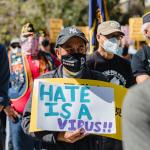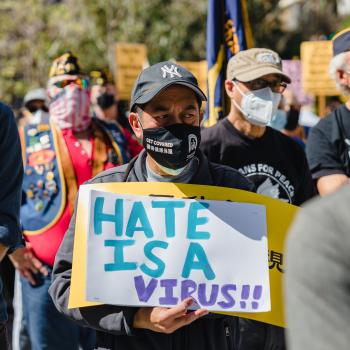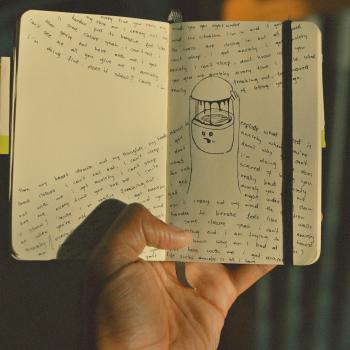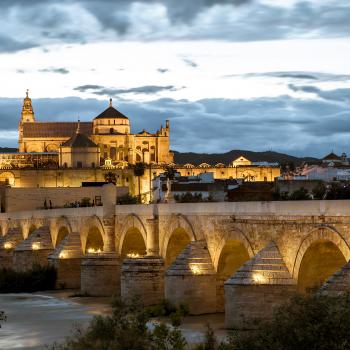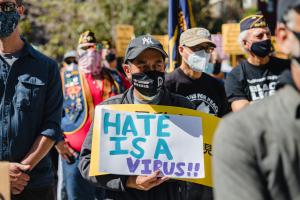 In a free society, you are what you pretend to be. In an authoritarian dictatorship, you are what you are told to be. But on a desert island, you are who you are. What makes solitude a religious discipline is that only when we are totally isolated can we discover our true identity apart from both social and political considerations. When the only relationship available to us is the one with God, the only emotion—apart from loneliness—becomes love. Even our relationship with the remorseless natural world inspires no personal contempt. At the very worst, it might solicit our indifference. What this suggests is that the problem of hate and bigotry is not just a psychological phenomenon, but a social one. Other than enforcing a radical form of social segregation, as some mystics have done, how can we stop hate from becoming a political force?
In a free society, you are what you pretend to be. In an authoritarian dictatorship, you are what you are told to be. But on a desert island, you are who you are. What makes solitude a religious discipline is that only when we are totally isolated can we discover our true identity apart from both social and political considerations. When the only relationship available to us is the one with God, the only emotion—apart from loneliness—becomes love. Even our relationship with the remorseless natural world inspires no personal contempt. At the very worst, it might solicit our indifference. What this suggests is that the problem of hate and bigotry is not just a psychological phenomenon, but a social one. Other than enforcing a radical form of social segregation, as some mystics have done, how can we stop hate from becoming a political force?
What is Hate?
Plainly defined, hate is a response to the fear of losing one’s identity.
Every human being is endowed with two primary identities. The first is the identity that evolves in response to our ego’s needs. And the second identity is the one that is uncontaminated by the world of subjective human perceptions, which I will refer to as our Desert Island identity or DIID – not to be confused with Freud’s Id.
We are all born with an innocent Desert Island Identity and yet, with every minor and major pain we experience from birth onwards, we evolve coping mechanisms or personality traits that contribute to the development of our ego-self. The ego-self is determined by the attributes we inherit like race and gender, as well as those we acquire through our experiences.
Good or bad, our ego-self is a false self that is for the most part, at least in the initial stages of our spiritual maturation, nothing more than a product of our circumstances. For all practical purposes, our ego is our identity, and its primary role is its own self-defense. What we defend ourselves against becomes who we are.
We are defined by our struggles.
As a Muslim, I do not think of the ego as an enemy to be conquered. I merely acknowledge its role in my life on earth. And at times I salute my ego-self as the part of me designed to survive difficult circumstances. I believe this even though I know that our ego is finite and develops in relation to other finite beings, while our Desert Island Identity develops in relation to an infinite force, we call God.
In Eastern religious traditions, as well in some metaphysical New Age thought, those who identify exclusively with their DIID are called enlightened masters, mystics, or prophets.
Those of us who live in free societies have multiple ego identifications. I am an American, but I am also a Muslim, a woman, a mother, a writer, a baker, an optimist, a community activist, and a friend, just to name a few. My ego identifies with all of the above. When any of the above identities feel threatened, I remain cognizant of the fact that they are all false crutches, and that my true identity is the one that exists apart from all these social constructions.
As long as I am free to develop my ego with enough freedom to cope with reality, then my ego becomes a means to an end and not the means to my end or the end of others.
There are three things that differentiate my ego from the ego of someone who perpetuates hate and may even engage in acts of violence:
First, hate is the emotional response of an ego whose thoughts and actions are unmitigated by the DIID. In other words, it is an ego that is disconnected from any kind of infinite spiritual orientation and can only achieve a sense of immortality by attaching itself to an ideal greater than itself, such as nationalism or tribalism.
Second, hate is the emotional response of an ego that develops a singular identity to the exclusion of all others, usually in response to a threat or a perceived threat to that specific identity.
Third, an ego that is driven by hate is by nature finite because it is singular and can therefore only survive if it congregates around other egos who share its singular identity. It makes no difference what singular identity a group gathers around, whether it’s race or religion or even a noble ideology. Every form of collective ego identification leads men to murder and hate.
What we are dealing with, when we speak of hate, is a psychological state that has nothing to do with God and is only connected to religion in so far as its doctrines can be employed to inflate and empower the collective ego. Hate is not the attachment to one’s own ego-self to the exclusion of one’s Desert Island Identity. Hate is the detachment from both forms of identification in exchange for a collective identity. Hate is a social phenomenon that arises only in cultures or subcultures that do not honor or celebrate the individual right to volitionally develop an ego, independently of others.
The remedy for this is not to turn exclusively to God and away from the world. (I might be peaceful and holy on a desert island, but I would not be useful). The solution to the proliferation of hate and bigotry is that we remain steadfast in the advancement of a political philosophy founded on two non-negotiable principles: individual rights and objective law.
When the long-held theory of human nature as inherently evil finally yielded to the notion that man is innately moral and good, the world was forever transformed. It was this historical shift in our understanding of human nature, a nature with a DIID, that became the impetus for the actualization of the enlightenment ideals of individual rights, objective law, liberalism, democracy, and faith in science.
The ability to craft our own ego identifications, while simultaneously believing that our true nature apart from all these social constructions is one of purity and goodness is a heroic psychological achievement; And the best counteragent to hate.
In a free society, we are who we pretend to be—and I choose to pretend that I am more determined, than I sometimes feel, to make this world a better place. Meanwhile, on a beautiful island far, far away, I am totally perfect and one with God. And I didn’t have to do a single thing to get here.

